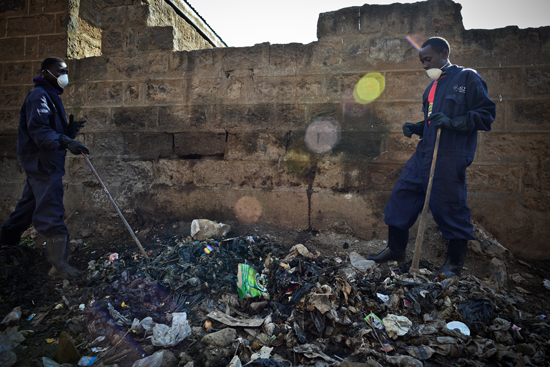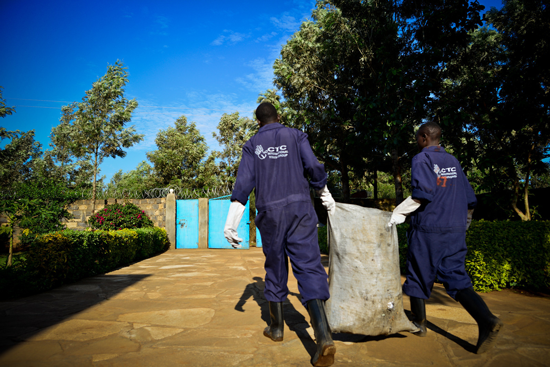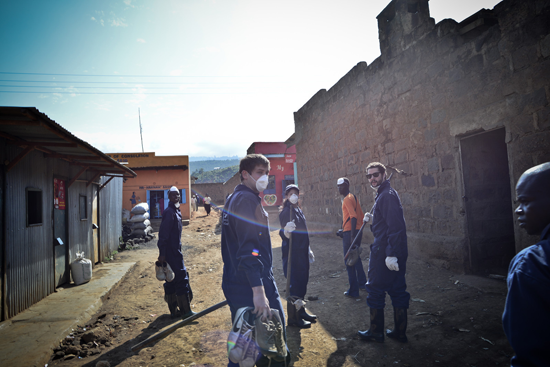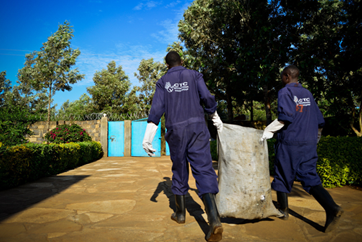What:
In early 2012, CTC’s youth program was awarded the waste management contract for the Naivasha District. This waste management service provided in Maai Mahiu and founded by CTC youth is the first ever of its kind in the area.

Photos by Chelsea Dee Photography
Why:
Before the start of the Waste Management Program, the only community-wide effort to take environmental responsibility was CTC's monthly Ubuntu Day. Obtaining the waste management contract has created a more sustainable solution for the city's sanitation issues. From a health perspective, food and waste attract pests and vermin, which can lead to the spread of disease in the community. Mosquitoes breed in anything that can hold water, like the inside of an old car tire or empty bottles. People can get diseases like tetanus and leptospirosis if they cut or scratch themselves on pieces of metal, nails or glass. Organized waste management will lead to an improved community appearance and quality of life for residents. This is a great opportunity for the local community to see CTC making a measurable change.

How:
-
CTC collects a small monthly fee from residents and businesses who elect to register for the weekly trash removal services.
- The program currently has 203 clients and enrollment continues to climb each month.
-
CTC's community health workers help educate the community about the benefits of our service, as well as teaching how to properly dispose of trash rather than throwing it into the streets as has always been done in the past.
- CTC is currently beginning to introduce basic composting techniques to community members.
- Every home and business registered in the program is provided with a reusable trash bag.
- Currently CTC is able to employ 6 youth in the program and hopes to create more jobs for youth as more clients join the program.


What's Next:
- The program has seen substantial growth since its start in early 2012, growing from one client in its first month to over 200 clients in a little over a year. The ultimate goal is to increase the client base to a size of 1,500, which would encompass the entire town of Maai Mahiu.
- CTC plans to add an educational component to the Waste Management Program by training the employed youth in customer service and financial literacy.
- As the revenue from the project increases, CTC also hopes to start a beautification project in the community. This would involve planting flowers and trees throughout the community, which would in turn decrease the levels of dust.
- CTC is also looking into a program that would enable the recycling of waste water. Currently there is no drainage system in the community, so a lot of water is wasted on a daily basis. If a system is developed to collect this water it could then be used for other purposes, such as watering plants in the beautification project.
- CTC is also doing research into a Community Cooker, which would recover the energy from collected waste and be able to provide a stove top or hot water for showers, as well as create another source of employment within the community.
- Within the next five years, CTC hopes to develop a simple device that will be able to recycle polyurethane bags and plastics. This program would also provide more employment opportunities for the youth.
Overall the program has been a huge success. Bernard Owino, the program's director, reflects on the progress made within the past year saying that initially it was nearly impossible to sign on clients. The people in the community were used to paying their taxes to the government and seeing no results. However, as the program began to spread throughout the community, people began approaching him directly and eagerly requesting the service. Bernard says that having patience is vital as we introduce this brand new service, and he is hopeful for the future of the program.
Further Reading:
Partners:
Nakuru County Government

